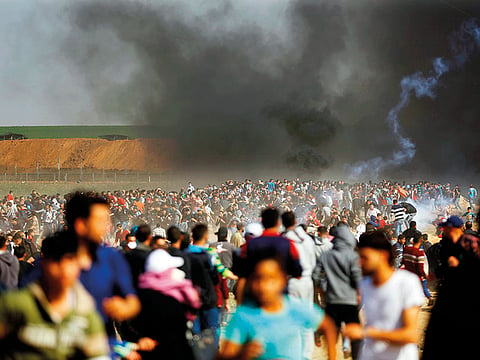Israeli brutality will lead to more protests
Palestinians ‘confronting very real policies of violent repression’

Occupied Jerusalem: Thousands of Palestinians took part in a mass protest along Gaza’s volatile border with the Zionist state, the second large-scale demonstration in what is expected to be a steady turnout over the coming weeks.
More than 30 Palestinians were killed and hundreds more wounded by the occupation army’s fire in mass protests on Friday and the previous week.
While the occupation regime has claimed it has used live fire only as a “last resort” witness accounts and amateur videos have shown demonstrators to be unarmed or far from the fence when they were shot. The regime’s brutal response to the protests and indiscriminate killings have led to international outrage, generating unusual levels of critical attention to Israel and galvanising greater Palestinian enthusiasm for confrontation. The United Nations and European Union have called for an independent investigation. Further Israeli regime escalation against protesters will likely have similar effects, strengthening support and fuelling conflict.
Hamas says the protests are against a decade-old border blockade by Israel. The Israeli regime’s blockade, wars, international isolation and failed attempts at reconciliation have left Gaza’s economy in tatters.
Unemployment is approaching 50 per cent, according to official Palestinian figures. Gaza’s 2 million residents receive only a few hours of electricity each day, tap water is undrinkable and the coastline has been polluted by tons of untreated sewage. The blockade greatly restricts the movement of people and goods in and out of the small territory of barely 360 square kilometres making it difficult to do business or travel abroad for work, school or family reasons.
While the occupation regime has claimed it has used live fire only as a ‘last resort’, witness accounts and amateur videos have shown demonstrators to be unarmed or far from the fence when they were shot.
President Donald Trump’s decision to move the US Embassy from Tel Aviv to occupied Jerusalem generated widespread anger among Palestinians, many of whom were already disillusioned with the Oslo peace process. Gaza in particular has suffered for years. The Trump administration’s talk of “the deal of the century” did nothing to ease uncertainty among Palestinians, who have been largely left out of the discussions and have been unsettled by leaked details of the deal.
International organisations like the World Bank and United Nations say the blockade continues to stifle the economy. They have repeatedly urged the regime in Tel Aviv to ease the restrictions significantly.
Hamas has called for a series of demonstrations in the coming weeks, culminating on May 15, the 70th anniversary of the Zionist state’s establishment. Palestinians mark the date as their nakba or catastrophe, when hundreds of thousands were forced to flea from their homes.
Yousuf Munayyer, executive director of the US Campaign for Palestinian Rights, likened attempts to cross Israel’s fence to American civil rights marchers’ attempts to cross the Edmund Pettus Bridge in Selma, Alabama, more than 50 years ago. He said he saw the demonstrations as an opportunity for a strategic shift by Palestinians.
“This is not a battle that protesters are coming to with guns,” he said. “They’re coming to it with their bodies and they’re confronting very real policies of violent repression. The protesters paid with their lives to get people to question whether these policies are justifiable,” he said.
“Frankly, I think this is Israel’s Achilles’ heel,” he added, “and it’s very important in this moment for the international community to be supportive of the protesters. They’ve always said, ‘Abandon militancy, abandon violence.’ If the international community allows the violent repression of these protests without any real condemnation or intervention to stop the killing, it’s going to send a message that the world doesn’t want any Palestinian resistance - not violent, not nonviolent, not anything in between.”



